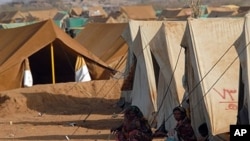The U.N. refugee agency reports more than 200,000 people have been displaced by the conflict in northern Yemen. It says the growing number of displaced is straining the ability of aid agencies to shelter and care for those forced to flee their homes.
The U.N. refugee agency says thousands of civilians in north Yemen are fleeing to neighboring provinces in a desperate search for safety, shelter and assistance. It says it is fast running out of space and money to care for them.
The current wave of fighting between the government and al-Houthi rebels is entering the sixth month and by all accounts is intensifying.
U.N. refugee spokesman Andrej Mahecic says battles keep shifting from one place to another, forcing many people to be displaced a number of times.
"These newly displaced people bring stories of intense clashes in Razeh, Saqain and Sahar districts and report dozens of civilian casualties as a result of air strikes and heavy fighting," he said. "UNHCR is not present in the conflict area and has no independent confirmation of these reports. We now estimate that some 200,000 people have been affected by the conflict in Yemen since 2004, including those displaced by the latest escalation which erupted in early August last year," he added.
Mahecic says camps for the displaced are stretched to capacity and aid resources are quickly becoming depleted. He says the UNHCR is looking around for sites to erect new camps.
"The shelter situation is equally dire in Amran province where most of the arriving IDPs are staying with host families or renting places. Over the New Year's week alone, more than 5,000 IDPs arrived to Amran City," Mahecic said. "The acute lack of shelter and accommodation is creating tensions between the displaced and the local population. In the absence of an immediate and feasible camp option, UNHCR is planning to set up a transit center in Amran as an interim and temporary solution," he concluded.
The United Nations has issued a $177-million appeal on behalf of all U.N. agencies working in Yemen. So far, less than one percent of that appeal has been received.
200,000 Displaced in Northern Yemen Fighting




